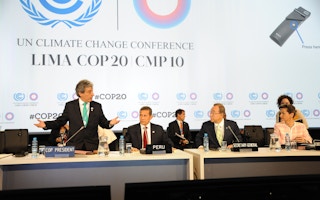The annual UN Climate Talks ended on Sunday in Lima, Peru. In case you were wondering, nothing happened.
To continue reading, subscribe to Eco‑Business.
There's something for everyone. We offer a range of subscription plans.
- Access our stories and receive our Insights Weekly newsletter with the free EB Member plan.
- Unlock unlimited access to our content and archive with EB Circle.
- Publish your content with EB Premium.
In fact, possibly worse than nothing happened. Instead of being on track to sign, in December 2015 in Paris, a binding agreement to cut harmful emissions backed by all nations, we are forcefully sliding towards an agreement for each nation to do what it wants, including nothing.
There is a new acronym at the UN jargon university for this: ‘Intended Nationally Determined Contributions’, or INDCs. It’s a code-word for everyone to do what they please, in two steps.
First, key governments worldwide will maybe (or maybe not) outline, by March 2015, what actions (i.e., INDCs) they intend to take under a global agreement.
Second, the INDCs are intended to be added up into an agreement in Paris and compared against what we need to do to limit temperature increases to 2 degrees, the accepted climate change speed limit.
But because these INDCs amount to nothing, we already know that any agreement in Paris will also amount to nothing. INDCs won’t have binding (legal) consequences, aren’t subject to review and don’t come with transparent, strong monitoring obligations.
Two consequences are clear, as they have been for some time.
First, emissions will continue to rise as the rot from a failed UN process spreads to every corner of the world.
Second, as I argued previously, instead of wasting resources on a failed UN process, we should target the 90 companies which are responsible for two-thirds of the harmful emissions generated since the industrial age began. Eighty percent of their reserves need to be locked away underground to avoid a catastrophe.
This tiny number of large companies, lobbying to prevent action on climate change, are at the heart of our current carbon-intensive model. They know that their business model is not under threat from the UN climate talks.
Shell - leveraging the climate debate
In Lima, Shell’s top climate advisor was comfortable enough to admit that Shell enjoys its relationship with the notorious American Legislative Exchange Council (ALEC), a shadowy shop specialised in aggressive efforts to counteract emissions reductions and regulations.
This is the same ALEC which, in the words of Google executive chairman Eric Schmidt, is “literally lying” about climate science.
Big Oil is fighting a broader battle, trying to influence public opinion and governments at a national and community level.
I experienced their tactics far away from Lima last week, when I had the displeasure of attending National Geographic’s ‘Big Energy Question’ round table event in New Delhi, India. This invitation-only forum convened 40 experts on air pollution in India, to examine its causes, its impacts on the environment and health, and possible solutions.
Four of these experts were from Shell, a prominent member of history’s top 90 polluters. Shell was also paying the costs. Its logo was everywhere, cuddling alongside National Geographic’s.
Well, the predictable happened: The event was hijacked by Shell, ensuring that the Government of India didn’t hear of any solutions which did not prominently feature oil and gas.
The first word, last word, and most of the words in between
I wanted to see first-hand Big Oil in action, co-opting respected brands, academics and experts, throwing its money around. In New Delhi, Shell sprinkled its representatives around the room, controlling the debate as well as extracting the right to the last word.
As it turns out, Shell got the word after the last word too. After the proceedings closed, a heretofore undisclosed Shell representative felt he had to emphasise the company’s commitment to powering India.
That presumably includes significantly worsening its already dreadful pollution levels. According to the World Health Institute, six of the top ten most polluted cities in the world are in India.
There was not a word about Shell’s support for groups opposing climate regulations; for Arctic drilling; for covering up the extensive destruction of the environment in the Niger Delta; or for the fact that over the past 10 years, Shell’s potential emissions from tar sands (oil produced from tar sands is the world’s dirtiest and most environmentally destructive) increased by five times, according to a new report by New York based Fossil Free Indexes.
What Shell was doing in India was pernicious: It was leveraging all the goodwill associated with National Geographic’s brand (“inspiring people to care about the planet since 1888”) to subvert real climate action.
The one power big enough to take on Shell, and its like
Big Oil knows that the international capital markets are the only power which can force them to keep their reserves in the ground, by increasing their financial cost of capital to a level commensurate with their destructive activities.
What better way to ensure the capital markets don’t turn against them than by co-opting innocent brands like National Geographic to dilute expert opinion?
Rising investor and regulatory voices (including that of the Bank of England) want to know what happens if untapped deposits of oil, gas and coal become stranded assets - because extracting them dooms us - and this movement is gaining traction from Wall Street to the City of London. That’s the real threat to Big Oil’s business model and Shell knows it.
We need to stop Big Oil’s efforts to silence the substantive debates experts are trying to have around the world about the most effective way to shift to 100% clean energy by 2050.
And it’s time for the likes of National Geographic to do their part by refusing Big Oil’s corrupting money.
This op-ed was originally published in The Ecologist.











